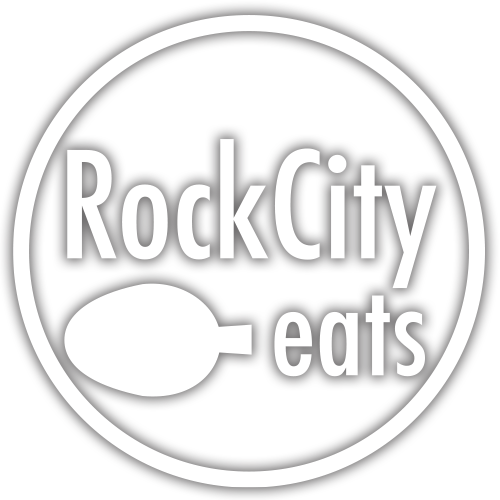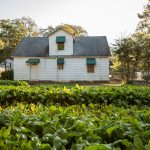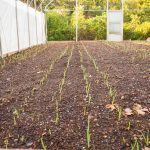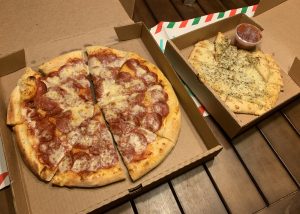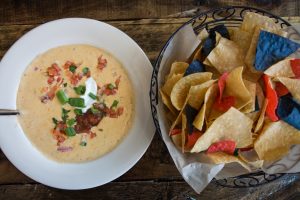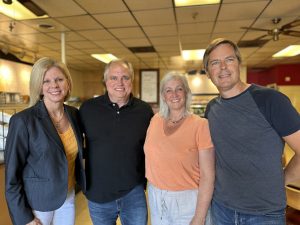Before there was Little Rock Urban Farming’s (LRFU) G Street garden, founder Christopher Hiryak knew he wanted to do something big. He says, “I wanted to prove to myself and all of my friends and family, that at a minimum, we can do this organically and eat.”
The ‘this’ in that statement initially refers to one thing: living the life of a sustainable farmer. Today, it’s expanded to include founding LRUF, the Southern Center for Agroecology, and spreading knowledge about a sustainable lifestyle.
Let’s start back at the beginning. Hiryak was born and raised in Little Rock. He attended UALR and as a Donaghey Scholar, decided to triple major in History, International Studies, and Spanish. He also somehow found time for a minor in Information Technology.
If you’ve actually been out to the garden, you may have expected Hiryak to have a more agricultural background. He says, “Really, I have no formal training in agriculture, all of that came from practical experience on the farm.”
His interest in gardening predates college, so it was natural that his thesis landed on Arkansas agriculture after the second world war. His research, along with the fact that his family once operated on forty acres with a mule, got him thinking.
“If you really think about history, our world is so different than it was even sixty years ago, and a lot of that is due to the industrialization of agriculture,” he says. Even after graduating and beginning his job search, he couldn’t shake that thought. When potential employers asked him what he could do if he could do anything he said, “I think I would just be a farmer.”
Even so, he worked in sales for a time, although his lunch break was his favorite part of the day. He says, “I would go over to the Dunbar Garden and spend my lunch break … I still credit that place with giving me a lot of inspiration.”
Hiryak knew he wouldn’t spend his life in sales, so he packed up and headed to the Ozarks to immerse himself in an apprenticeship program with Dripping Springs Garden. He says, “I got a really heavy dose of small scale organic farming and a very heavy dose of Ashtanga yoga. That was really important for me. I didn’t want to just have an organic farm, I wanted to feel alive.”
When he returned home he was working with the Arkansas Children’s Hospital Research Institute at UAMS as the garden manager, and even though he loved the job, he had unfinished plans. He says “I had always had this vision for my property and I was even building it while I was working [at Children’s].”
He needed help to really get the farm going, so he brought in some apprentices. “I was just on fire to create this thing and I needed help. I got lucky, and I was around really good people,” he says. He’s since been overwhelmed at how tight the friendships have grown and how many people have come out to help make his vision come to life.
A few years later, Hiryak had expanded enough to be able to sell at farmer’s markets. Now on year seven of his journey, he’s still learning new things everyday. He says, “For me it is my art. That is what I do – this is my art to the community.”
Throughout his work in growing LRUF, he found time to do more. He was involved with LeadAR, a leadership program through the division of agriculture. He traveled the state, listening to speakers as they told the story of their community. He says, “That’s when I got to meet the true constituency of Arkansas, and I realized how big of an anomaly I was in the agricultural scene.”
At the time, he felt like a major underdog. LRUF started out with two twenty foot beds that couldn’t fill a farmer’s market booth. He laughs and says, “It was very humble beginnings for this tiny garden … now I feel a little more confident when I go and speak or meet people because I’ve built something. It’s not much, but it’s something and I can stand on it.”
These days, LRUF has a CSA component, frequents the farmer’s market circuit, and does business with many local restaurants. Anyone would be happy to stop there, but not Hiryak.
In fact, he has been working hard the past three years to put together a different outlet for the educational element that comes along with sustainable agriculture. This year the Southern Center for Agroecology became that outlet as a nonprofit organization. He explains the goal behind the venture: “I want the nonprofit to educate as many people in our community about where their food comes from, about the different forms of agriculture, and the way their food is produced. That’s the goal and we’re going to do that through art, digital media, presentations, and hands-on workshops
For the nonprofit he often speaks before groups – schools, libraries, various organizations – and has programming in the works. Currently, the Southern Center for Agroecology is headquartered at LRUF, although the two are separate entities.
A new Beginning Farmer program is one of the first orders of business of the center. Hiryak says, “It’s a very custom program at this point because there’s only a handful of young people that are really in a position to start a farm, but it’s nice because I get a lot of one-on-one time with them. I’m connecting them with other mentors in the community,” he says.
Needless to say, Hiryak has found his calling. Even with his nonprofit work, he spends half a day or more out in the garden, every day. He’s happy for the how far the local food scene has come, but he sees that we can do more. He says, “We should be proud – but we’ve still got a long way to go.”
